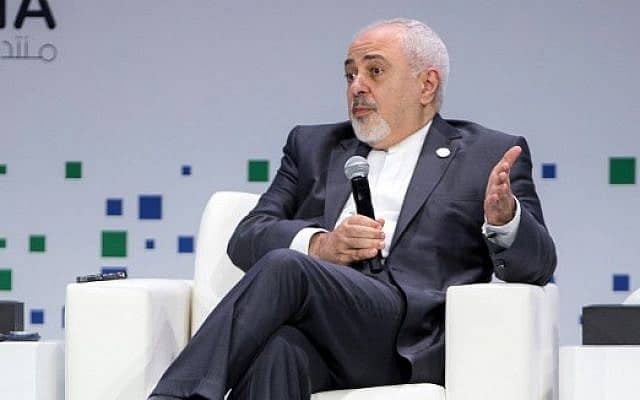Iranian Foreign Minister Mohammad Javad Zarif at the Doha Forum, Qatar, December 15, 2018 (AFP)
Foreign Minister Mohammad Javad Zarif has hailed Iran’s “art of evading sanctions”, as the Islamic Republic tries to shield its troubled economy from US restrictions.
Zarif expressed his defiance at the Doha Forum on Saturday:
It’s obviously the case that we are facing economic pressure because of the US sanctions. [The] US is a major global power and it can actually create painful conditions for other countries. But would that lead to a change of policy? I can assure you that it won’t.
If there is an art, we have perfected in Iran and can teach to others for a price, it is the art of evading sanctions.
He continued, “We’ve survived against the United States, against the will of the United States for the last 40 years, and I believe we will survive for the next 40 years.”
The Trump Administration imposed comprehensive sanctions on November 5, including on Iran’s energy and financial sectors, following the US withdrawal in May from the 2015 nuclear agreement between Tehran and the 5+1 Powers (US, UK, France, Germany, China, and Russia).
The Islamic Republic was already struggling with production, trade, investment, and employment before the imposition, and its oil exports have fallen 60% between April and November.
However, US sanction waivers through March on Iran’s top oil customers have buffered a sharper fall. Government intervention has brought a recovery in the Iranian currency, after a historic 75% drop from January to October.
The rial, which sank as low as 190,000:1 v. the US dollar, is now at 103,500:1.
Talks With US Possible If Sanctions Lifted
Zarif said negotiations with the US are possible, but set the condition that Washington must return to the nuclear deal.
I can tell you as somebody who did all the talking for that document (the JCPOA) that neither Iran nor the United States can get a better document. So there is room for talk. But you need first to respect the outcome of the talks you already had.
He elaborated, “There is no reason to engage in talks while the results of long and very difficult talks are still up in the air and the United States is actively trying to undermine those results.”
Speaking in the capital of Qatar — enduring a Saudi-led blockade since May 2017 — Zarif focused on Riyadh as the center of the region’s problems, including the “humanitarian nightmare” of the Yemen civil war
“Unfortunately, Saudi Arabia does not want to reduce tension. Actually, Saudi Arabia believes that it is in its interest to increase tension,” Zarif asserted.
Referring to both Yemen — where millions are at risk in the battle between the Houthi insurgency and a Government propped up by a Saudi-led coalition — and the murder of journalist Jamal Khashoggi, Zarif said the US and its allies “need to show that bad behavior would get a bad response”.
The Foreign Minister denied that Iran had contributed to the carnage in Yemen with its support of the Houthis.
We have never provided weapons to Houthis. They have enough weapons, they don’t need weapons from Iran….
If there are allegations about Iranian weapons, there are facts about US weapons, facts about Saudis bombing the hell out of the Yemenis.

